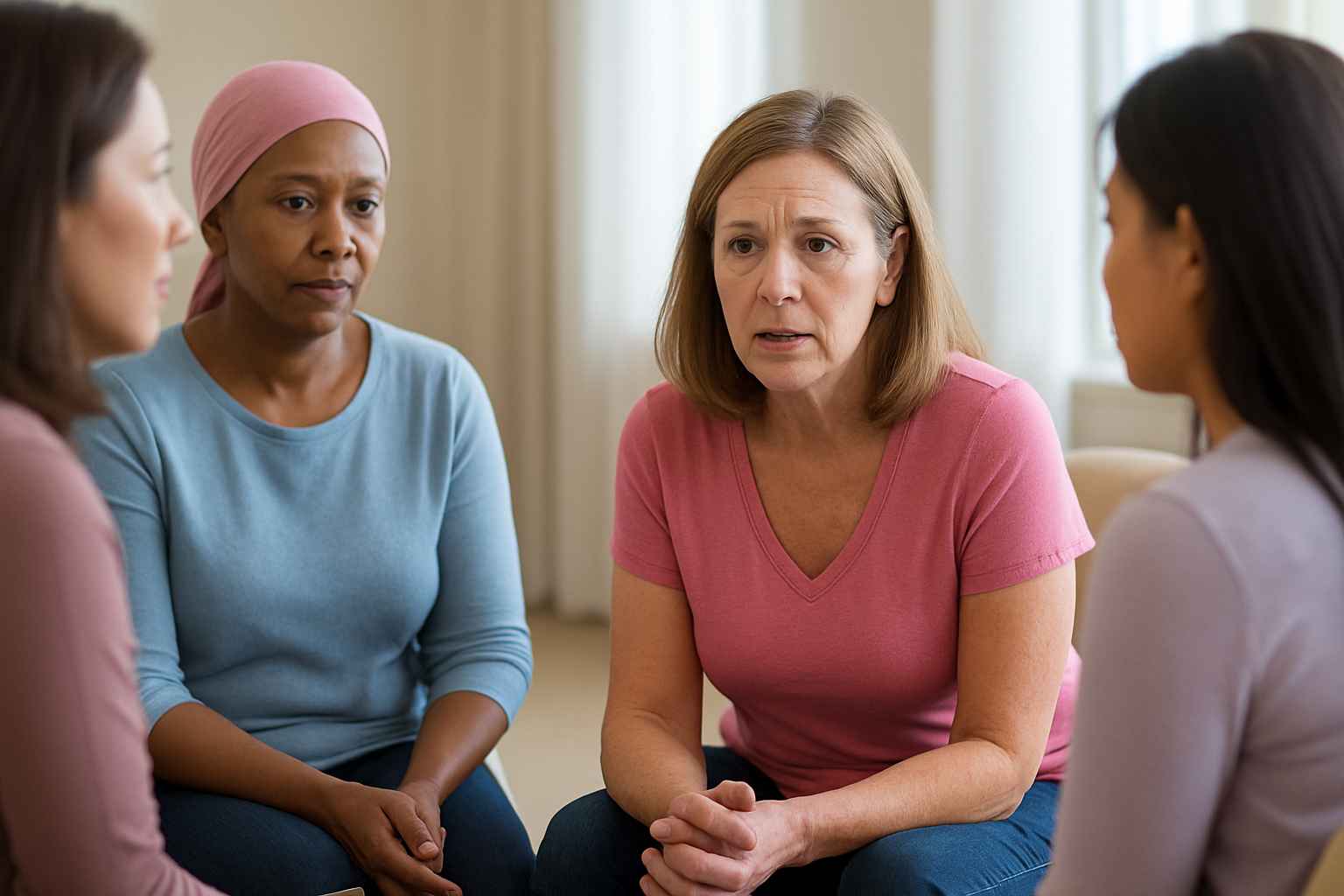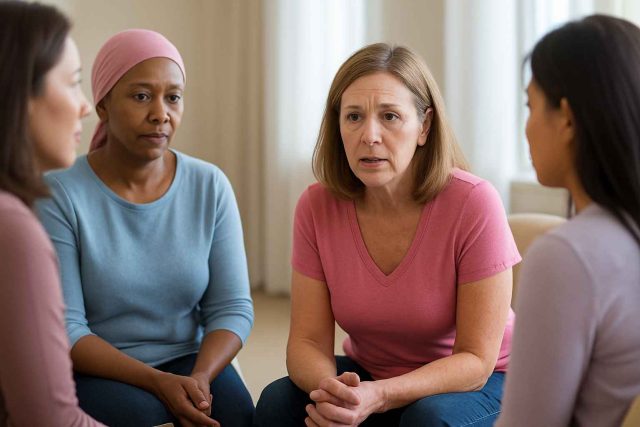
Receiving a breast cancer diagnosis can feel like being swept into a storm you never saw coming. Suddenly, you’re navigating medical jargon, treatment decisions, and an emotional rollercoaster—all at once. For many, this journey feels isolating. Yet through community, awareness, and practical tools, strength often emerges in unexpected ways.
That’s why this article explores actionable breast cancer coping strategies, with a focus on support, managing treatment side effects, and building inner resilience. Whether you’re newly diagnosed, in active treatment, or navigating survivorship, the information here is designed to empower and uplift.
Table of Contents
- Emotional and Social Support Systems
- Managing Physical and Mental Side Effects
- Strength Through Self-Care and Mindset
- Digital Tools and Community Resources
- Conclusion and FAQs
Emotional and Social Support Systems
Support is one of the most important elements in any breast cancer journey. Not only does it ease emotional burden, but studies show that strong support systems can even improve treatment outcomes.
Many people turn first to family and friends. These connections offer daily companionship and encouragement. Yet, others may struggle to communicate openly with loved ones. That’s where professional and peer support come in.
Therapists who specialize in oncology can help patients process grief, anxiety, and anger. Meanwhile, cancer-specific social workers are trained to connect patients with local resources and benefits. Online platforms like Health.healingwell.com also host breast cancer discussion boards where users exchange real-time advice and emotional validation.
Support groups—whether in person or virtual—can be life-changing. They provide safe, judgment-free zones where patients can discuss sensitive topics like body image, fear of recurrence, or treatment decisions.
Spiritual or faith-based communities also offer solace to many, particularly when facing uncertainty. Regardless of where you find connection, what matters is having someone who listens and understands.
Managing Physical and Mental Side Effects
Cancer treatment is often as challenging as the disease itself. While protocols like chemotherapy, radiation, and hormone therapy save lives, they can also take a toll on the body and mind. Understanding how to manage side effects is essential for maintaining quality of life.
Fatigue is one of the most common complaints among breast cancer patients. It’s not just tiredness—it’s a deep exhaustion that rest doesn’t easily resolve. Balancing activity with rest, prioritizing nutrition, and speaking with your care team about energy conservation techniques can help.
Hair loss, a side effect of chemo drugs like Taxol (paclitaxel) and Adriamycin (doxorubicin), can deeply impact self-image. Some find comfort in wigs, scarves, or going bald boldly. What matters most is choosing what feels empowering to you.
Nausea and vomiting are also frequent concerns. Antiemetic medications such as Zofran (ondansetron) are often prescribed to combat this. Eating smaller meals and avoiding strong smells may further reduce discomfort.
Radiation can cause skin sensitivity. Using gentle cleansers and fragrance-free moisturizers, and wearing loose clothing, can help protect skin during this phase.
Emotionally, many patients experience anxiety, depression, or mood swings—especially if taking medications like Tamoxifen or Aromasin. It’s crucial not to dismiss these symptoms. Speak to your oncologist or explore counseling options through platforms like Healthcare.pro for support tailored to your medical history.
Never hesitate to ask about pain management. Palliative care is not just for end-of-life—it’s for improving comfort at any stage of the cancer journey.
Strength Through Self-Care and Mindset
Mental strength isn’t about avoiding emotion. It’s about acknowledging it, then choosing how to respond. Cultivating resilience can be a daily practice—and it’s often the little things that add up.
Self-care means more than bubble baths or scented candles. It includes setting boundaries, saying no when needed, and asking for help without guilt. Some patients find journaling helpful for tracking thoughts and progress. Others turn to mindfulness techniques or guided meditation.
Exercise, even gentle stretching or short walks, can boost mood, reduce fatigue, and improve sleep. Programs like yoga for cancer patients are increasingly available both online and in cancer centers.
Many find that creative outlets such as painting, music, or writing provide a sense of agency and healing. Others are drawn to nature, prayer, or advocacy work.
You don’t need to be “strong” all the time. Allow space for rest, sadness, and uncertainty. At the same time, celebrate your wins—no matter how small. Whether it’s finishing a chemo cycle, getting out of bed, or simply choosing hope, every step matters.
Digital Tools and Community Resources
Technology has opened new doors for people living with breast cancer. From health tracking to virtual therapy, digital resources can enhance care and make daily life more manageable.
Apps like MyChart or Cancer.Net offer symptom tracking, appointment reminders, and educational articles all in one place. These tools help patients communicate more effectively with providers and advocate for their needs.
Podcasts and YouTube channels hosted by survivors and oncologists can offer both medical insight and personal comfort. Subscribing to trustworthy sources ensures that the information you’re receiving is accurate and current.
Community forums such as Health.healingwell.com allow users to connect with others experiencing similar challenges. These conversations can reduce isolation, foster camaraderie, and offer firsthand insight into coping strategies.
Web-based exercise programs, nutrition advice, and telehealth counseling have also made integrative care more accessible than ever before.
It’s worth checking if your cancer center offers access to patient portals, virtual workshops, or survivorship planning tools. Many now do.
Conclusion and Key Takeaways
Living with breast cancer is a journey that touches every part of life—physical, emotional, and spiritual. There’s no single roadmap, but with strong support systems, effective coping strategies, and compassionate communities, patients can navigate this path with strength and dignity.
Whether you are adjusting to a diagnosis, enduring treatment, or rebuilding life in remission, know this: you’re not alone. Resources exist to support every phase, and within you lies a resilience more powerful than any diagnosis.
FAQs
What are common emotional challenges during breast cancer treatment?
Anxiety, sadness, and fear of recurrence are common. Counseling and support groups help process these feelings constructively.
Can diet and exercise help with treatment side effects?
Yes. Balanced nutrition and moderate exercise can boost energy, support immunity, and improve mood.
Are there ways to cope with body image changes?
Absolutely. Options include wigs, breast prostheses, or reconstructive surgery. Peer support also plays a vital role.
Where can I connect with other breast cancer patients?
Online communities like Health.healingwell.com provide a supportive space for sharing advice and encouragement.
Is it normal to feel overwhelmed after finishing treatment?
Yes. Many people feel vulnerable after active treatment ends. Survivorship programs and counseling can ease the transition.
Disclaimer:
This content is not medical advice. For any health issues, always consult a healthcare professional. In an emergency, call 911 or your local emergency services.




